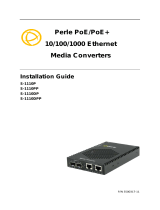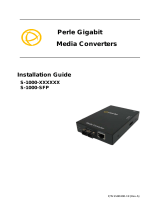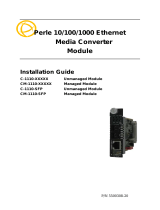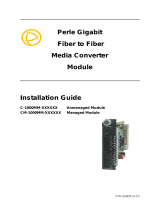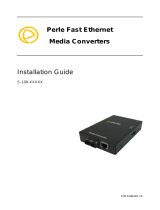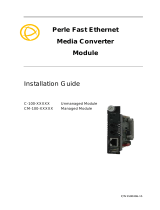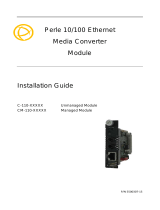Page is loading ...

P/N 5500440-10 (Rev F)
Perle Gigabit
Media Converters
Installation Guide
SR-1000-XXXXXX-(XT)
SR-1000-SFP-(XT)

SR-1000 Ethernet Media Converter Installation Guide
2
Preface
Audience
This guide is for the network or computer technician responsible
for installing the Perle SR-1000 Gigabit Media Converter.
Familiarity with the concepts and terminology of Ethernet and local
area networks is required.
Purpose
This document describes the hardware and physical
characteristics of the Perle SR-1000 media converter. It covers
hardware features as well as installation and operation of the
SR-1000.
Package Contents
• SR-1000 Media Converter with attached DIN Rail mounting
bracket
• Installation Guide (this guide)
Document Conventions
Note: Means reader take note: notes contain helpful suggestions.
Caution: Means reader be careful. In this situation, you might
perform an action that could result in equipment damage or loss of
data.
Warning: IMPORTANT SAFETY INSTRUCTIONS
Means danger. You are in a situation that could cause bodily
injury. Before you work on any equipment, be aware of the
hazards involved with electrical circuitry and be familiar with
standard practices for preventing accidents. Only qualified
personnel should connect power to this unit.
Cautions and Warnings
Warning: Power sources must be off prior to beginning the power
connection steps. Read the installation instructions before you
connect the unit to its power source.

SR-1000 Ethernet Media Converter Installation Guide
3
Warning: These devices are open-type devices that are to be
installed in an enclosure with a tool removable cover or door,
suitable for the environment.
Warning: Power supply of the equipment must be rated
appropriately (See the Technical Specification section for
specification with limited power). Limited power means complying
with one of the following:
• Class 2 circuit according to Canadian Electrical Code, Part 1,
C22.1
• Class 2 circuit according to National Electrical Code, NFPA-70
• Limited Power Supply (LPS) according to EN/IEC 60950-1.
• Limited-energy circuit according to EN/IEC 61010-1
Warning: If this equipment is used in a manner not specified by
the manufacturer, the protection provided by the equipment may
be impaired.
Warning: In case of malfunction or damage, no attempts at repair
should be made by the user. All repairs need to be made by a
qualified Perle representative. Do not dismantle this product.
Warning: Transient protection shall be provided that is set at a
level not exceeding 140% of the peak rated voltage value at the
supply terminals to the equipment.

SR-1000 Ethernet Media Converter Installation Guide
4
Overview
This document contains instructions necessary for the installation
and operation of the Perle Gigabit Industrial Ethernet Media
Converters (SR-1000). These products convert a 1000Base-T
cable connection (copper) to a 1000Base-X connection (fiber).
The fiber connection can be either single mode (SM) or multimode
(MM) and can operate over different wavelengths and distances,
depending on the model selected (see table below). Perle Media
Converters (SR-1000) are also available in Extended Temperature
models.
Model Connector Mode - Distance
Wavelength
SR-1000-SC05
(XT)
SC MM - 550 m/1804 ft. 850 nm
SR-1000-ST05
(XT)
ST MM – 550m/1804 ft. 850 nm
SR-1000-SC05U SC MM – 550m/1804 ft. 1310/1550 nm
SR-1000-SC05D SC MM – 550m/1804 ft. 1550/1310 nm
SR-1000-SC2 SC MM – 2 km/1.25 mi.
1310 nm
SR-1000-ST2 ST MM – 2 km/1.25 mi. 1310 nm
SR-1000-SC10
(XT)
SC SM – 10 km/6.2 mi. 1310 nm
SR-1000-ST10
(XT)
ST SM –10 km/6.2 mi. 1310 nm
SR-1000-SC10U
(XT)
SC SM – 10 km/6.2 mi. 1310/1490 nm
SR-1000-SC10D
(XT)
SC SM – 10 km/6.2 mi. 1490/1310 nm
SR-1000-SC20U SC SM – 20 km/12.4 mi. 1310/1490 nm
SR-1000-SC20D SC SM – 20 km/12.4 mi. 1490/1310 nm
SR-1000-SC40 SC SM – 40 km/25 mi. 1310 nm
SR-1000-ST40 ST SM – 40 km/25 mi. 1310 nm
SR-1000-SC40U SC SM – 40 km/25 mi. 1310/1490 nm
SR-1000-ST40D ST SM – 40 km/25 mi. 1490/1310 nm
SR-1000-SC70 SC SM – 70 km/40.3 mi. 1550 nm

SR-1000 Ethernet Media Converter Installation Guide
5
SR-1000-ST70 ST SM – 70 km/40.3 mi. 1550 nm
SR-1000-SC80U SC SM – 80 km/50 mi. 1550/1590 nm
SR-1000-SC80D ST SM – 80 km/50 mi. 1590/1550 nm
SR-1000-SC120 SC SM – 120 km/74.6 mi. 1550 nm
SR-1000-ST120 ST SM – 120 km/74.6 mi. 1550 nm
SR-1000-SC120U SC SM – 120 km/75 mi. 1510/1590 nm
SR-1000-SC120D SC SM – 120 km/75 mi. 1590/1510 nm
SR-1000-SC160 SC SM – 160 km/100mi. 1550 nm
SR-1000-ST160
ST SM – 160 km/100 mi. 1550 nm
SR-1000-SFP-(XT) SFP Note 1
Note 1: Fiber characteristics will depend on the SFP fiber module
selected
Note: Please visit Perle’s web site for the most up to date
Installation guides, models and specifications:
http://www.perle.com/

SR-1000 Ethernet Media Converter Installation Guide
6
Installation
These are the steps required to configure the SR-1000 Gigabit
media converter:
1. Insert SFP Module (SFP Model only).
2. Set the DIP switch settings. (optional)
3. Install and connect the fiber cable.
4. Install and connect the copper cable.
5. Power up the media converter.
The default DIP switch settings (all switches in the UP position)
will work for most installations.
Accessing the DIP Switches
To access the DIP switches:
1. Disconnect the power source.
2. Release both tabs as located in the diagram (Step 1).
3. Gently slide the case open to expose the DIP switches
(Step 2).
4. Slide the case open about 1/3 of the way until you hear an
audible click. Do not force the case completely open.

SR-1000 Ethernet Media Converter Installation Guide
7
DIP Switches
Set the DIP Switches accordingly, and then slide the case
together until you hear an audible click.
1 Reserved
2 Auto Negotiation
3 Smart Link Pass-Through
4 Fiber Fault Alert
5 Duplex Mode
6 Pause
7 Loopback
8 Reserved

SR-1000 Ethernet Media Converter Installation Guide
8
DIP Switch Settings
Reserved (Switch 1)
Auto Negotiation (Switch 2)
Switch Position Mode
Up (default) On
Down Off
On: In this mode of operation the media converter will negotiate
Ethernet parameters on both the copper and the fiber connection.
This will ensure the most optimal connection parameters will be in
effect. If connecting to another Perle Gigabit Media Converter, this
switch should be set to On.
Off: The Auto Negotiation should only be turned off, if the fiber link
partner does not support fiber link negotiations.
When the Auto Negotiation switch is set to the Off position, the
media converter will still negotiate the Ethernet parameters with
the copper link partner. The parameters used in this negotiation by
the media converter will be determined by the Duplex Mode
(switch 5) and Pause (switch 6) switch settings.
Smart Link Pass-Through (Switch 3)
Switch Position Mode
Up (default) Disabled
Down Enabled
Disabled: In this mode (if Auto Negotiation is set to Off), the links
on the fiber and copper sides can be brought up and down
independently of each other. A loss of link on either the fiber link
or copper link can take place without affecting the other
connection.
However, if the Auto Negotiation (switch 2) is set to On, then a
loss of link on the copper side will result in a loss of link on the
fiber side but not vice versa.
Enabled: In this mode, the link state on one connection is directly
reflected through the media converter to the other connection. If

SR-1000 Ethernet Media Converter Installation Guide
9
link is lost on one of the connections, then the other link will be
brought down by the media converter.
If the installation has a media converter on both ends of the fiber
link and both are setup for Smart Link Pass-Through, then a loss
of copper link on the far end device will propagate through both
media converters and will result in a loss of link at the near end
device. This would, therefore, resemble a direct copper
connection.
Fiber Fault Alert (Switch 4)
Switch Position Mode
Up (default) Enabled
Down Disabled
Enabled: In this mode, if the media converter detects a loss of
fiber signal on the fiber receiver, it will immediately disable its fiber
transmitter signal. This, in effect, notifies the fiber link partner that
an error condition exists on the fiber connection.
If the remote media converter is set up for Fiber Fault Alert (FFA)
Enabled and the local media converter is set up with Smart Link
Pass-Through, a loss of fiber link on either the transmit or receive
line will be passed through to the local copper connection thus
notifying the connected device.
If the media converter has been set to Smart Link Pass-Through
mode, the effect will be the same as FFA, since the link loss on
the fiber receiver will result in bringing down the copper link, which
will in turn cause the transmit fiber link to be brought down.
Note: This feature only takes effect if Fiber Negotiation has been
turned off.
Disabled: In this mode, the media converter will not monitor for
fiber fault.
The following diagram is an illustration of the operation of this
feature.

SR-1000 Ethernet Media Converter Installation Guide
10
(A) – Remote Media Converter setup for Fiber Fault Alert Enabled,
Fiber Negotiation – OFF and Link Mode – Normal.
(B) – Local Media Converter setup for Smart Link Pass-Through
and Fiber Negotiation - OFF
(A) loses fiber connection on its receiver
(A) disables fiber transmitter
(B) detects loss of link in its fiber receiver
(B) drops link on copper connection through Smart Link Pass-
Through
(A) Link on copper connection is not affected
Duplex Mode (Switch 5)
Switch Position Mode
Up (default) Auto
Down Half
Auto: In this mode, when Auto Negotiation has been turned off
(SW 2), the media converter will use this Duplex setting for its
Ethernet parameter negotiation on the copper connection. In the
Auto position, the media converter will advertise support for both
Full and Half Duplex mode. The resultant negotiation will provide
the most optimum connection.
Half: In this mode, the media converter will force the negotiation to
Half Duplex mode.
Note: The Duplex parameter has no direct effect on the operation
of the media converter. These are provided so that the attached
device (near end) can negotiate its Ethernet parameters as if it
was negotiating directly with the far end device. These parameters
on the media converter should match those of the far end device.
Pause (Switch 6)
Switch Position Mode
Up (default) Enabled
Down Disabled
Enabled: In this mode, when Auto Negotiation has been turned
Off (SW 2), the media converter will use this setting for its Ethernet
parameter negotiation on the copper connection. With this Pause

SR-1000 Ethernet Media Converter Installation Guide
11
switch in the Enabled position, the media converter will advertise
support for Symmetrical and Asymmetrical Pause.
Disable: The media converter will not advertise support for the
Pause feature.
Note: The media converter will not act on, or generate any Pause
Ethernet messages, but will pass them through to the end device.
This switch setting is provided so that the attached device (near
end) can negotiate its Ethernet parameters as if it was negotiating
directly with the far end device. The Pause switch setting on the
media converter should match the capabilities of the far end
device.
Loopback (Switch 7)
Switch Position Mode
Up (default) Disabled
Down Enabled
Disabled: The loopback feature is disabled. This is the normal
position for regular operation. The switch must be set to this
position for data to pass through the media converter.
Enabled: When enabled, all data received on the receive (RX)
fiber connection is looped back to the transmit (TX) fiber
connection. The state of the copper is not relevant and no data or
link status is passed through to the copper side.
Reserved (Switch 8)
Installing the SFP Fiber Module
The SR-1000-SFP requires an SFP fiber module.
1. Locate your fiber module, and then insert the module into the
transceiver opening.
2. Ensure the SFP module is properly seated.
3. The SFP module may be inserted before or after applying
power to the media converter.
4. Proceed with cable connections.

SR-1000 Ethernet Media Converter Installation Guide
12
Installing the Duplex Fiber Cable
• Locate a 1000Base-X compliant duplex (2 strands) fiber cable
with male connections.
• Connect the fiber cables from one media converter to the other
media converter/switch/fiber device ensuring that the RX and TX
are reversed at the opposite end.
Installing the Simplex Fiber Cable
Locate a 1000Base-X compliant simplex (1 strand) fiber cable with
male connections.
• Connect the fiber cable from one media converter to the other
media converter/switch/fiber device.
Installing the Copper Cable
• Locate 1000Base-TX compliant copper cables with male, RJ45
connectors installed at both ends.
• Connect the RJ-45 cable between the Perle media converter and
the device.
Note: The Perle media converter supports Auto-MDI-X, either a
straight-through or cross over Ethernet cable may be used.

SR-1000 Ethernet Media Converter Installation Guide
13
Connecting the Terminal Block
The terminal block provides two power inputs. Both power inputs
can be connected to the SR-1000 to provide redundant power to
the SR-1000. If one power supply should fail the SR-1000 will use
the other power supply to continue to power the unit without
interruption. Wiring with suitable temperature ratings must be
used. Use copper conductors only.
1. Ensure the power source is off prior to connection.
2. Strip both (12-20AWG) wires 7-8 mm(5/16th).
3. Loosen the terminal block screws and connect positive
(+)/negative (-) wires into the +/- terminals.
4. Tighten terminal screws (0.5Nm torque). Ensure the wires are
securely fastened.
5. If desired, connect P2 (power source 2, beginning at Step 1)
6. Turn on the power at source.
7. Check that the PWR LED light is lit.
8. Check LED indicators in the guide before and applying power
to the media converter.
9. Ensure that there is one individual conductor for each
clamping point.

SR-1000 Ethernet Media Converter Installation Guide
14
Operation
Status LED
The SR-1000 Gigabit Media converters have three status LEDs
located on the front panel of the unit.
PWR - Power/Test
• On: Power is on and the unit is in normal operation mode.
• Blinking quickly: the unit is in loopback mode.
• Blinking slowly: the unit has a hardware error.
LKF - Fiber Link/Activity
• On: Fiber link present.
• Blinking quickly: Fiber link present and receiving data.
• Blinking slowly: Fiber link disabled because of copper link
loss.
• Off: No fiber link present.
LKC - Copper Link/Activity
• On: Copper link is present.
• Blinking quickly: Copper link present and receiving data.
• Blinking slowly: Copper link disabled because of fiber link
loss.
• Off: No copper link present.

SR-1000 Ethernet Media Converter Installation Guide
15
Other Features
Default Operating Mode:
In the default operating mode (all switches up), the media
converter will auto-negotiate on both the fiber and the copper links
at the same time, thus achieving the best end-to-end Ethernet
operating parameters. If the fiber link is not present, it will still
permit the copper link to be established, but will not negotiate a
fiber link if the copper link is not present. Therefore, the device
attached to the media converter will not see a loss of link if the
fiber connection is lost.
Auto-MDI-X with Skew Correction:
Auto-MDI-X (automatic medium-dependant interface crossover)
detects the signalling on the 1000BASE-T interface to determine
the type of cable connected (straight-through or crossover) and
automatically configures the connection. The media converter can
also correct for wires swapped within a pair.
Error Recovery:
In certain configurations, and under specific conditions where the
media converter brings down a link to convey status, there is
potential for a deadlock. Recovery is achieved by momentarily
restoring the link to see if the original failure has been resolved. If
it has not, the link will be forced down again, however if the
original problem has been resolved, the link will be restored.
Example: If two converters are setup for FFA. The detection of a
fiber link failure (RX) will cause one media converter to disable its
fiber transmitter (TX). This in turn will cause the other to do the
same, and a deadlock condition has been created. The media
converter will periodically turn on its transmitter (TX) to re-start the
link and see if the original failure has been resolved. If not, the TX
is once again turned off.

SR-1000 Ethernet Media Converter Installation Guide
16
Troubleshooting
General
• Ensure power is supplied to the media converter.
• Ensure both devices on either end of the fiber are compatible.
If using a single fiber connection, ensure that you have both
an Upstream (U) and Downstream (D) media converter.
• Ensure all cabling is of the correct type and is in good
operating condition.
• For dual-stranded fiber connections, ensure the RX and TX
has been reversed between the 2 media converters.
No connectivity
If unable to get full connectivity with all DIP switches in the UP
position, this procedure is recommended for troubleshooting.
Method 1
1. Turn off Fiber Negotiation (SW2 Down) on both media
converters. Leave all other switches UP.
2. Connect the near end device to the copper connection. The
LKC LED indicates good copper connection. If the LKC LED is
not lit, then check the copper cable and the attached device.
3. Repeat for the far end device.
4. Connect the fiber cable to both media converters. The LKF
LED indicates good fiber connection. If no LKF LED then
check the fiber cabling.
5. Return units to desired configuration.
Method 2:
The fiber connection can also be verified by configuring the
remote media converter for loopback mode. The LKF LEDs on
both media converters should be lit. Data should pass through the
local converter, over the fiber connection to the remote media
converter. At the remote media converter, the data will be looped
back and passed through the fiber, once again, to pass through
the local converter to the copper link.

SR-1000 Ethernet Media Converter Installation Guide
17
Technical Specifications
The following applies to all SR-1000 media converters.
Input Supply Voltage
9.6-60VDC 0.4A max, unregulated
(12/24/48-VDC nominal)
Power Consumption
2.4 watts
Operating Temperature
-10°C - 60°C (14°F - 140°F
Storage Temperature: -40°C - 85°C (-40°F - 185°F)
Operating Temperature (XT) -40°C - 75°C (-40°F -167°F)
Storage Temperature (XT) -40°C - 85°C (-40°F -185°F)
Operating Humidity: 5% to 90% non-condensing
Storage Humidity: 5% to 95% non-condensing
Operating Altitude: Up to 3,048 m (10,000 ft.)
Weight: 0.12kg
Dimensions SC 114 x 100 x 22.5 mm
ST 126 x 100 x 22.5 mm
SFP 117 x 100 x 22.5 mm
Safety
UL/ULC/EN 62368-1
CAN/CSA C22.2 No. 62368-1-14
UL 61010-1 and UL 61010-2-201
Laser Class I Safety – IEC 60825-1:2014
IEC-60825-1:2014 standard and complies with FDA/CDRH
21 CFR1040.10 and 21 CFR1040.11
EMI/EMC
FCC 47 Part 15 Class A
ICES-003
EN55032(CISPR32)
EN61000-6-4
EN55024
IEC/EN 61000-6-2 General Immunity for Industrial Environments
IEC/EN 61000-4-2 (ESD): Contact:
EN 61000-4-3 (RS)
EN 61000-4-4 (EFT)
EN 61000-4-5 (Surge)
EN 61000-4-6 (CS)
EN 61000-4-8 (PFMF)
EN 61000-4-11

SR-1000 Ethernet Media Converter Installation Guide
18
Fiber Optic Specifications
The following table applies to all SR-1000 media converters.
Model Mode
Wavelength
(nm)
TX Power
(dB)
RX Power
(dB)
Budget
(dB)
SR-1000-SC05
(XT)
MM
TX: 850
RX: 850
Min: -9.5
Max:
-
4
Min: -17
Max:
-
3
7.5
SR-1000-ST05
(XT)
MM
TX: 850
RX:
850
Min: -9.5
Max:
-
4
Min: -17
Max:
-
3
7.5
SR-1000-SC05U MM
TX: 850
RX: 850
Min: -9.5
Max:
-
4
Min: -17
Max:
-
3
7.5
SR-1000-SC05D MM
TX: 850
RX: 850
Min: -9.5
Max:
-
4
Min: -17
Max:
-
3
7.5
SR-1000-SC2 MM
TX: 1310
RX: 1310
Min: -6
Max: 0
Min: -17
Max: 0
11
SR-1000-ST2 MM
TX: 1310
RX: 1310
Min: -6
Max: 0
Min: -17
Max: 0
11
SR-1000-SC10
(XT)
SM
TX: 1310
RX: 1310
Min: -9.5
Max:
-
3
Min: -20
Max:
-
3
10.5
SR-1000-ST10
(XT)
SM
TX: 1310
RX: 1310
Min: -9.5
Max:
-
3
Min: -20
Max:
-
3
10.5
SR-1000-SC10U
(XT)
SM
TX: 1310
RX: 1490
Min: -9
Max:
-
3
Min: 20
Max:
-
3
11
SR-1000-ST10D
(XT)
SM
TX: 1310
RX: 1310
Min: -9
Max:
-
3
Min: -20
Max:
-
3
11
SR-1000-SC20U SM
TX: 1310
RX: 1490
Min: -8
Max:
-
3
Min: -22
Max:
-
3
11
SR-1000-ST20D SM
TX: 1310
RX: 1490
Min: -8
Max:
-
3
Min: -22
Max:
-
3
11
SR-1000-SC40 SM
TX: 1310
RX: 1310
Min: -3
Max: 5
Min: -23
Max:
-
3
20
SR-1000-ST40 SM
TX: 1310
RX: 1490
Min: -3
Max: 2
Min: -23
Max:
-
3
20
SR-1000-SC40U SM
TX: 1310
RX: 1490
Min: -3
Max: 2
Min: -23
Max:
-
3
20
SR-1000-SC40D SM
TX: 1490
RX: 1310
Min: -3
Max: 2
Min: -23
Max: -3
20
SR-1000-SC70 SM
TX: 1550
RX: 1550
Min: 0
Max: 5
Min: -23
Max:
-
3
23
SR-1000-ST70 SM
TX: 1550
RX: 1550
Min: 0
Max: 5
Min: -23
Max:
-
3
23

SR-1000 Ethernet Media Converter Installation Guide
19
Model Mode
Wavelength
(nm)
TX Power
(dB)
RX Power
(dB)
Budget
(dB)
SR-1000-SC80U SM
TX: 1510
RX: 1590
Min: -2
Max: 3
Min: -26
Max:
-
3
24
SR-1000-SC80D SM
TX: 1590
RX: 1510
Min: -2
Max: 3
Min: -26
Max:
-
3
24
SR-1000-SC120 SM
TX: 1550
RX: 1550
Min: 0
Max: 5
Min: -32
Max:
-
9
32
SR-1000-ST120 SM
TX: 1550
RX: 1550
Min: 0
Max: 5
Min: -32
Max:
-
9
32
SR-1000-SC120U SM
TX: 1510
RX: 1590
Min: -3
Max: 2
Min: -34
Max:
-
9
31
SR-1000-SC120D SM
TX: 1590
RX: 1510
Min: -3
Max: 2
Min: -34
Max:
-
9
31
SR-1000-SC160 SM
TX: 1550
RX: 1550
Min: 2
Max: 5
Min: -34
Max:
-
9
32
SR-1000-ST160 SM
TX: 1550
RX: 1550
Min: 2
Max: 5
Min: -34
Max:
-
9
32
Fiber Cabling Requirements:
MM: 50/125 microns or 62.5/125 microns
SM: 9/125 microns
Ethernet Copper Cabling Requirements
• Category 5e UTP or STP
• Straight through or Ethernet crossover
Note: Please refer the product page on the Perle website for the
most up to date specifications.
http://www.perle.com/

SR-1000 Ethernet Media Converter Installation Guide
20
Mechanical Drawings
/
